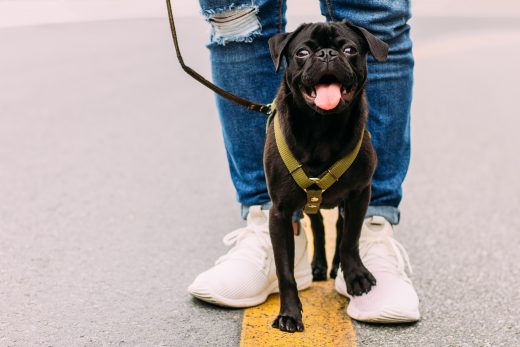
Bringing a puppy into your home is a very exciting and rewarding experience, but it also comes with a lot of responsibility. As a first-time dog owner, you might be filled with anticipation and a touch of anxiety about the journey ahead.
-
Preparation is Key
Before you even bring your new puppy home, there are some essential steps to ensure a smooth transition and provide the best possible start for your furry friend.
If you’re a first-time dog owner, you’ll find valuable guidance on puppy parenting in this comprehensive guide, but remember that for professional advice and healthcare services, you can always reach out to experts like those at saltwateranimalhospital.com.
Puppy-Proofing Your Home: Puppies are curious by nature and will explore every nook of your home. To prevent accidents and protect your belongings, puppy-proof your living space. This involves removing or securing hazardous items such as toxic plants, chemicals, small objects that can be swallowed, and electrical cords.
Choosing the Right Breed: Selecting the right breed is a crucial decision. Different breeds have varying needs, temperaments, and energy levels. Research breeds that align with your lifestyle and preferences, as this will influence your puppy’s compatibility with your household. Suppose you decide to get a purebred puppy, research reputable breeders. They will prioritize the health and well-being of their dogs and be willing to provide references. Alternatively, consider adopting from a rescue organization to give a loving home to a dog in need.
-
The First Days at Home
The first few days with your puppy are crucial for building trust and establishing routines. Here’s what you should focus on during this period.
Puppy’s Safe Space: Designate a safe and comfortable area for your puppy. A crate can be a helpful tool for this, as it provides security and aids in-house training. Ensure the crate is appropriately sized to give your pup enough room to stand, turn around, and lie down.
Puppy’s First Night: The first night can be challenging, as your puppy may be anxious about the new environment. To help them settle in, consider placing a warm water bottle wrapped in a towel in their crate and playing soft, soothing music. Be prepared for sleepless nights, as puppies frequently need to relieve themselves. Dogs thrive on routine. Set consistent meal times, potty breaks, and play sessions to help your puppy adapt to their new life. Regularity can make the transition smoother for both of you.

-
Socialization and Training
Puppyhood is a critical time for socialization and training. Proper socialization and positive reinforcement-based training are essential for your puppy’s development.
Expose your puppy to various people, animals, and environments during their socialization period (generally up to 16 weeks of age). This helps them build confidence and develop into a well-adjusted adult dog. Remember to make these experiences positive and non-threatening.
Basic training commands like sit, stay, and come are essential for safety and communication. Use positive reinforcement techniques, rewarding good behavior with treats and praise. Be patient, and keep training sessions short and fun.
Housebreaking your puppy can be a bit of a challenge, but consistency is the key. Take your puppy out regularly, after meals and after naps. Praise and reward them when they do their business outside. Be prepared for occasional accidents and avoid punishment, as it can confuse and frighten your pup.
-
Health and Nutrition
Ensuring your puppy’s health and proper nutrition is paramount. Regular vet visits and a well-balanced diet are crucial for your puppy’s growth and well-being.
Vet Visits: Schedule a vet appointment when you bring your puppy home. Regular check-ups and vaccinations are essential to keep your puppy healthy and prevent diseases. Your vet can also provide guidance on flea and tick prevention, spaying/neutering, and overall wellness.
Nutrition: Choose a high-quality puppy food appropriate for your pup’s breed and size. Follow the feeding guidelines on the packaging, and consult your vet for advice on portion sizes. Puppies have different nutritional needs than adult dogs, so ensure they get the right balance of protein, fats, and carbohydrates. Puppies have a lot of energy, and regular exercise is crucial for their physical and mental well-being. Tailor exercise to your puppy’s breed and age, ensuring it’s age-appropriate and doesn’t overtax them. Interactive play and short walks are good ways to burn off excess energy.
-
Grooming and Hygiene
Proper grooming and hygiene practices are essential for keeping your puppy healthy and comfortable. Puppies may not need frequent baths, as excessive bathing can strip their coat of natural oils. Follow your breed’s specific grooming recommendations, but generally, a bath every 2-3 months is sufficient. Use a mild, dog-friendly shampoo, and be sure to rinse thoroughly.
Regular brushing helps keep your puppy’s coat healthy, reduces shedding, and strengthens your bond. Brushing frequency depends on the breed and coat type. Short-haired breeds may need weekly brushing, while long-haired breeds require daily attention.
Trimming your puppy’s nails is crucial to prevent overgrowth, which can be painful. Use dog-specific nail clippers and avoid cutting too close to the quick. If you’re unsure, consult a professional groomer or your vet.
-
Common Challenges
As a first-time dog owner, you’ll likely encounter some common challenges. Understanding and addressing these issues will help you navigate them successfully.
Biting and Chewing: Puppies explore the world with their mouths, which means they’ll often bite and chew on things they shouldn’t. Provide plenty of appropriate chew toys and redirect their attention when they start nibbling on furniture or shoes. Consistency in training will help reduce unwanted biting behavior.
Separation Anxiety: Puppies can develop separation anxiety if left alone too often. Gradually accustom your pup to being alone for short periods, and use crate training to create a safe space when you’re not home. Avoid making a big fuss when leaving or returning, as it can exacerbate anxiety.
Leash Training: Leash training is crucial for your puppy’s safety and convenience. Start with short, positive sessions using a lightweight leash, and gradually increase the duration and distance of walks. Reward your puppy for walking calmly beside you.
-
Building a Strong Bond
Building a strong bond with your puppy is one of the most rewarding aspects of pet ownership. Here are some tips to foster a close, loving relationship with your furry companion.
Play and Affection: Spend quality time playing with your puppy and showing them affection. Playtime provides mental stimulation and strengthens the bond between you and your pup. Effective communication is key to understanding your puppy’s needs and desires. Pay attention to their body language, vocalizations, and cues. Positive reinforcement training enhances obedience and deepens your connection with your puppy.
Patience and Understanding: Remember that puppies learn and grow and will make mistakes. Be patient and understanding as you guide them through their development. Your love and support will help them become a well-behaved and happy adult dog.
-
Special Considerations
While we have covered the fundamental aspects of puppy parenting, some special considerations may arise during your journey as a first-time dog owner.
Multi-Pet Households: If you already have other pets, such as cats or older dogs, introducing a new puppy may require extra care. Supervise their initial interactions and give your existing pets space to adjust to the new addition. Be patient and ensure each pet gets the attention they need.
Allergies and Health Issues: It’s essential to be aware of any allergies or health issues that family members may have, especially if they are triggered by pet dander. Some breeds are considered hypoallergenic and may be more suitable for households with allergy concerns.
Travel and Vacations: Planning vacations and travel when you have a puppy requires careful consideration. You’ll need to arrange for a pet sitter, boarding, or accommodations that welcome dogs. Traveling with a puppy may also require special arrangements, such as bringing their crate and essentials.
-
The Adolescent Stage
As your puppy grows, they will enter adolescence with unique challenges and considerations.
Adolescence Characteristics: During adolescence, your puppy may exhibit behaviors like increased independence, testing boundaries, and a surge in energy. This phase can be challenging but is a normal part of their development.
Consistent training remains crucial during adolescence. Continue reinforcing basic commands and working on any behavioral issues that arise. Patience and positive reinforcement are key to navigating this stage successfully.
Exercise and Mental Stimulation: Adolescent dogs often have a surplus of energy, so providing ample exercise and mental stimulation is essential to prevent boredom and destructive behaviors. Longer walks, interactive toys, and more advanced training activities can be beneficial.
-
Planning for the Future
Puppy parenting is not just about the here and now; it’s also about the future. Here are some considerations for long-term planning.
Aging and Senior Care: As your puppy grows into a senior dog, their needs will change. Be prepared for potential health issues with aging and consider diet, exercise, and overall care adjustments.
Legal and Financial Matters: It’s wise to consider the legal and financial aspects of dog ownership, including pet insurance, wills, and emergency care plans. These preparations can ensure that your pup receives the best care, even in unforeseen circumstances.
Puppy parenting is filled with joy, challenges, and unforgettable moments. You can ensure your furry friend’s happy and healthy life by preparing your home, providing proper care and training, and building a strong bond. Embrace the adventure of raising a puppy, and you’ll be rewarded with a loyal and loving companion for years.



